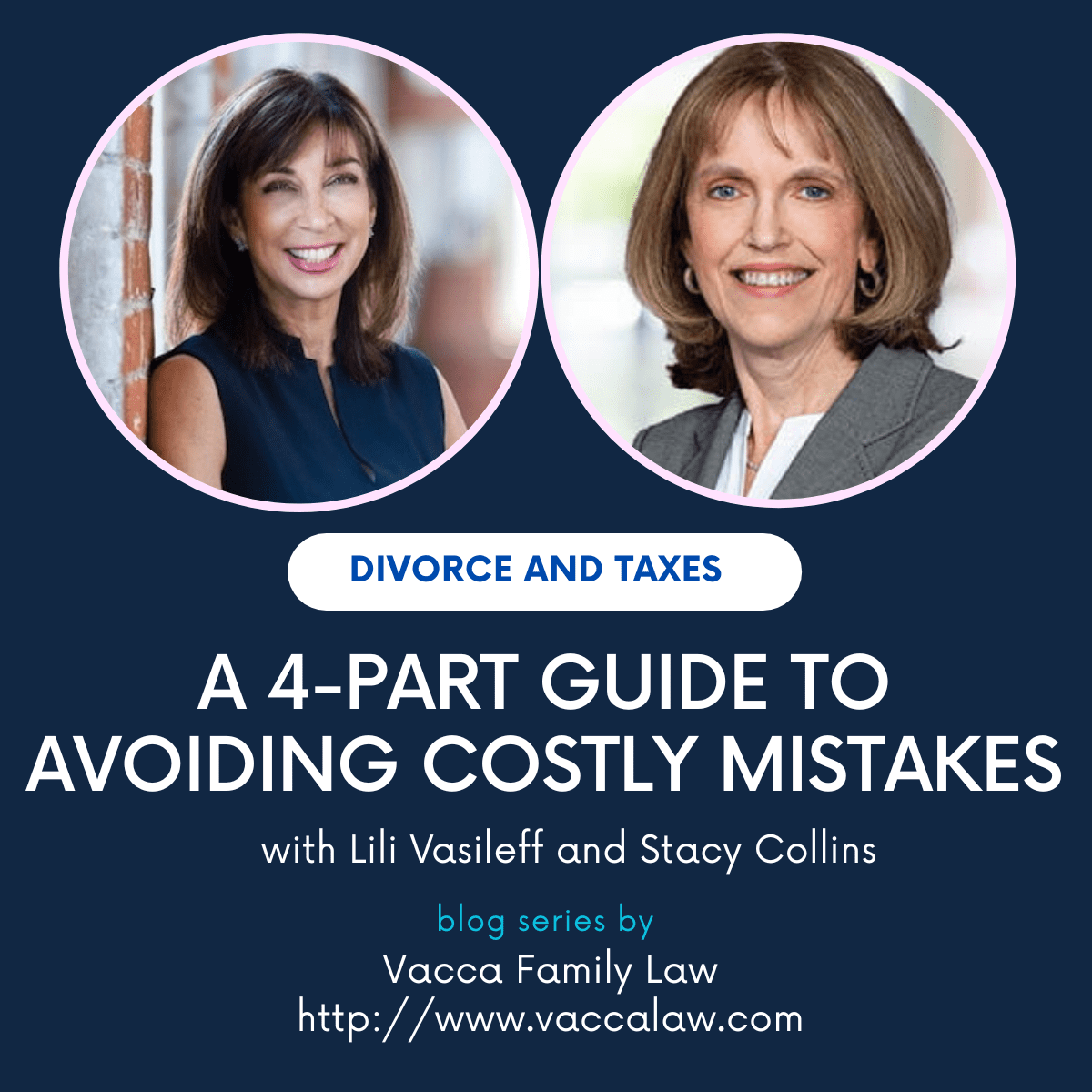Single boomers now represent close to one-third of all retirees
By Lili A. Vasileff, CFP, CDFA
Ms. Vasileff is a fee-only Certified Financial Planner™ professional, a Certified Divorce Financial Analyst, and President of Divorce and Money Matters, LLC with offices in CT and NY. Lili is a nationally recognized expert in financial planning for divorce as a practitioner, writer and speaker. She is the co-author of “The Ultimate Divorce Organizer: The Complete, Interactive Guide to Achieving the Best Legal, Financial, and Personal Divorce, and co-authored a chapter “Complex Compensation Issues In Divorce” in the book “Forensic Accounting in Matrimonial Divorce”, published by Wiley & Sons in 2006. Lili has many years of experience and an interdisciplinary knowledge of legal and financial issues. She brings expert analysis as well as clarity to complicated marital property and complex compensation issues for high net worth divorces. She is a qualified financial expert in CT, testifying to issues on lifestyle analysis, longevity of assets, and safe withdrawal rates. Her website is www.divorcematters.com.
Divorcing after age 50 is different and creates a sense of urgency for planning to survive financially. Most divorcing Boomers nearing retirement age will likely not have enough money to live as well as they had during their marriage years. Most advisors already face the disturbing prospect of telling their clients they may outlive retirement income. Dividing a marital estate just on the cusp of these years makes the primacy of the retirement income issue even greater. The shorter time for post divorce financial recovery requires a heightened need to generate income, or, a better understanding of the complexities of assets received in the property division.Wealth clearly makes a difference to retirement preparedness and to planning opportunities. Also, Boomers’ expectations about latter years play a role. Men are more likely than women to say they are very confident about several of the various financial aspects of retirement. More so than women, men feel that they are doing a very good job of preparing financially for retirement. Women typically say they do not know how much they need during retirement years and are more inclined to underestimate spending during the first five years prior to retirement. This underscores unique planning opportunities for divorce financial planners to address during the divorce process.
Financial Planning Opportunities
About one third of Baby Boomers are moving into old age as singles, due to divorce, being widowed, or never having married. Health care and outliving one’s assets in retirement are the two primary anxieties expressed by Baby Boomers. Divorce financial planners can help alleviate divorcing Boomers’ fears in certain key areas during the divorce process. Baby Boomers, especially those who are single, need expertise in financial planning to address:
Longer life expectancies
Intention/Requirement to work past normal retirement age (NRA)
Health insurance and gaps in coverage
Investment decisions for longer life expectancies
Declining Social Security and Pension benefits (strains on social system)
Estate planning for nontraditional (cohabiting) and blended families
Health Care
Baby boomers are encouraged to plan for future health care issues. The health conditions of those divorcing later in life are major influences on all stages of the divorce process. They should discuss cost, accessibility, quality of service, reputable service providers, as well as, perform a cost-benefit analysis of going without health, disability, or long term care insurances. The rationale for examining health care costs comes down to practicality, risk, and certainty.Men and women equally expect to receive retiree health insurance through an employer. In fact, workers report they have postponed retirement by a few years to retain or be eligible for an employer’s health insurance plan. The likelihood of an employee being uninsured is tied to the strength of the economy and the unemployment rate, but uninsured workers reported multiple reasons for not having coverage. Each year, many divorcing adults under the age of 65 lose their health insurance coverage for any number of reasons, with the most important being that they may not qualify for COBRA, (their employer is ineligible or as an individual), cannot afford COBRA, or they run eventually out of benefits. Demographically, women in particular face a higher risk of being uninsured.
In divorce, the risks of not being insured is one challenge; the risk of a divorced nonemployee spouse running out benefits under COBRA shy of qualifying for Medicare is a separate risk. This latter risk calls for considering seriously the timing of divorce
In divorce, the risks of not being insured is one challenge; the risk of a divorced nonemployee spouse running out benefits under COBRA shy of qualifying for Medicare is a separate risk. This latter risk calls for considering seriously the timing of divorce or for seeking a legal separation. In many cases, spouses’ with medical histories may feel either held hostage in the existing relationship or thwarted from entering a new one.The cost for health insurance may be exacerbated further if pursuant to divorce, an individual’s credit rating has suffered or an individual is dangerously dependent on support payments that are frequently paid late or go unpaid. The recipient spouse may be seriously challenged to secure health insurance for self and / or family when support is received infrequently or late, coupled with increasingly poor credit rating, limited access to credit, and a finite pool of assets (the settlement).Ex-spouses who fall mercy to these dire consequences have little success in applying for financial aid, state assistance or Medicaid if they have a legal order that states they are to receive “X” dollars of income (aka support) which exceeds eligibility income limits. Financial planning for contingency such as fault, unemployment, and disability, suggests allocating assets for liquidity, safety, and accessibility. Escrowing assets with an impartial third party may be another strategy to protect for health care costs. If health care is a priority for Boomers, it should not be dismissed easily as a major point of negotiation during divorce. Assets subject to division may address who retains and pays for health insurance, life insurance, disability insurance, long term care insurance, and unused sick pay.
Social Security
Baby Boomers will retire with fundamentally different work and earnings histories than prior generations. Retirees also need to plan for longer life expectancies. A married woman contemplating divorce today needs to think about extending the length of her marriage to 10 years. For marriages that last over 10 years, chances are that her husband’s lifetime earnings are greater than hers, and her benefits on his Social Security record as an ex-spouse (or divorced survivor) may be more valuable to her than those based on her own earnings record. His benefits are not reduced. One should examine all factors concerning the timing of when benefits are first taken, the amount of spousal benefits, and the individual’s projected mortality to create a strategy that effectively maximizes the lifetime value of Social Security benefits.
Pensions
As Boomers divorce closer to their retirement years, many pensions are no longer defined benefit plans with annuity payouts over life. Individuals are responsible for investing and managing their profit sharing accounts.The responsibility for investment risk has been shifted from the employer to the employee and ex-spouse – leaving room for important planning advice on allocation, diversification, risk management and analysis of cash flow. The planning challenge is to project cash flows: (1) based on investment scenarios to replace earned income, as well as, (2) based on developing solutions for creating cash flow, which may include reverse mortgages, annuitizing assets, decreasing expenses, etc.A divorce financial planner may help manage the ex-spouse’s expectations surrounding receiving support, sustainable living expenses, and longevity of assets during retirement years. Emotions surrounding money management and fear of the future are obvious and frequent impediments to a smooth divorce process.
Summary
Many dimensions of financial challenges face Boomers who divorce. With an interdisciplinary knowledge of the legal context of divorce, a divorce financial planner provides Boomers going through divorce with forward looking analysis for not only transition to single life, but transition into older stage of life with different (more finite) opportunities for financial remuneration, savings, and lifestyle. While many Boomers never anticipated becoming divorced in later years, specialized divorce financial planning can ease their anxieties and fears by evaluating options during the divorce process to foster confidence about the future.



